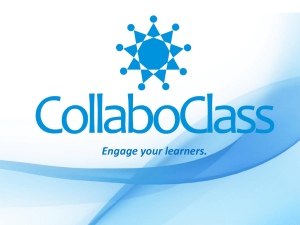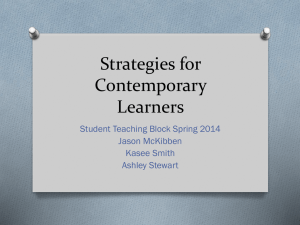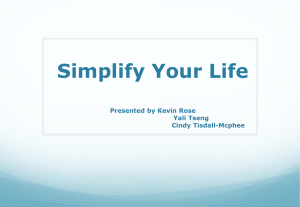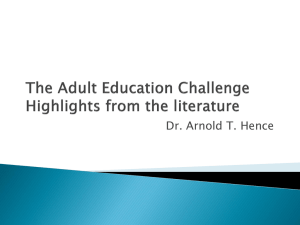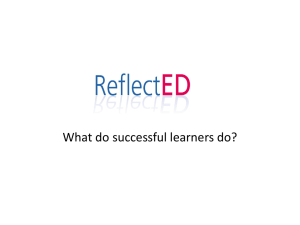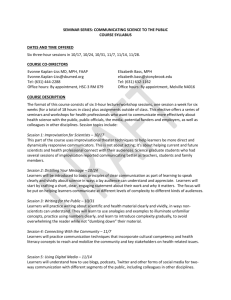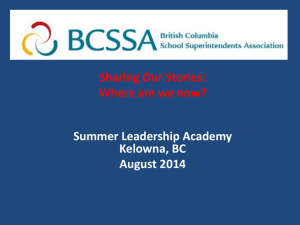Students First, Not Stuff
advertisement
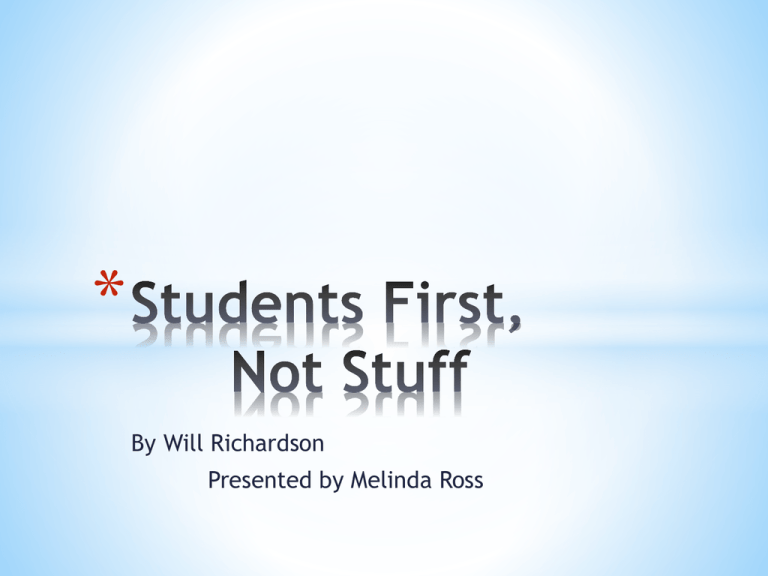
* By Will Richardson Presented by Melinda Ross * * Author of the highly ranked and read edublog Weblogg-ed and author of the book, Blogs, Wikis, Podcasts, and other Powerful Web Tools for Classrooms * Now an independent presenter and owner of Connective Learning, LLC * He is also an advocate for school reform which encourages the integration of technology in learning * Bachelor of Science in Journalism, Ohio University, Athens, OH, 1980. * Master of Arts (Teaching), College of New Jersey, Trenton, NJ, 1983 * Lives along the Delaware River in Western New Jersey with his wife Wendy and his children Tess and Tucker, all of whom are bloggers * *“Technological change is not additive; it is ecological, which means, it changes everything” * * Rapid and technological change is not what we signed up for is it? * Is school still the place where people receive their information? * Resistance is futile to new and changing technology * * Great news for kids! * Some want to limit technology * There is great use of technology outside of school which limits learning inside of schools due to Standardized assessments * What comes next? * How can we do it better? * * Learning is now truly participatory in realworld contexts. * Connecting with other learners outside school walls * This is when technology changes truly become ecological – students drive their own learning * * “We’ve spent billions of dollars on technology that by almost every measure has had little or no widespread effect” * This technology has been used poorly * It is not about tools, it is learning experience of the traditional curriculum * Educators must lead inclusive conversations * * If we define learning as “higher student achievement” or “improved student performance” as measured by test scores – we will deliver the current curriculum more effectively to make these scores “better” * “Productive learning is the learning process which engenders and reinforces why we want to learn more” * * It has never been more possible to access and research information * However, “wanting to learn more” means a transfer of power * Discover rather than learn * It is all about students pursuing their own interests in context of their curriculum * * It is not suggested that teachers have not used this approach before or that they rely only on technology * Due to the web these changes must become the rule in classrooms rather than the exception * Colearners * Experts at asking great, open-ended questions and modeling the learning process * Teachers should be master learners * * The redesign of literacy needs to change as well * “National Council of teachers of English suggests that literacy is much more than reading and writing texts” * This council defines 21st century literacies as including proficiency with the tools of technology * It is good to have the ability to share and design across multiple streams of information that meet a variety of purposes * * Users need to be productive with the technology – rather than be distracted by it * Its becoming increasingly more common for learners to educate themselves outside of traditional schooling * * Massively Open Online courses * Writing and responding to blogs, webinars, etc. * MOOC enabled more than 2,000 learners from all over the globe to educate themselves, one another, and model how to learn online, * Universities like Stanford, Princeton, MIT offer MOOCs * Online courses are led by experts in the field * These represent ecological change because they are free * * Offer full college credit for completion of free MOOCs * How do you feel about that? * Would you do that, if Bloomsburg offered it? * * The reality is that people no longer need to send their children to schools to learn algebra, U.S. history, or french * Most self-motiveated students can use MIT Open Courseware or Kahn Academy to acquire the knowledge they need to pass a typical test * The focus needs to develop learners rather than to make sure students learn * There now needs to be focus on individual passions, inquiry, creation, sharing, patient problem solving, and innovation * This does not mean that all information and knowledge is thrown out of the curriculum * * Long-term, inclusive conversations about what teaching, learning, and being educated means in relation to new technology * Education will continuously be changed * Students, not stuff * * My opinion on this article is that it is a very good stance to have on the new technology that is being incorporated into the schools. Rather than focusing on the devices, changing technology, and the web - educators should be focused more on the students and their needs. There are many new ways to learn, hands-on due to the technological advances that have been made over the past few years. These will also continue to grow and change *





